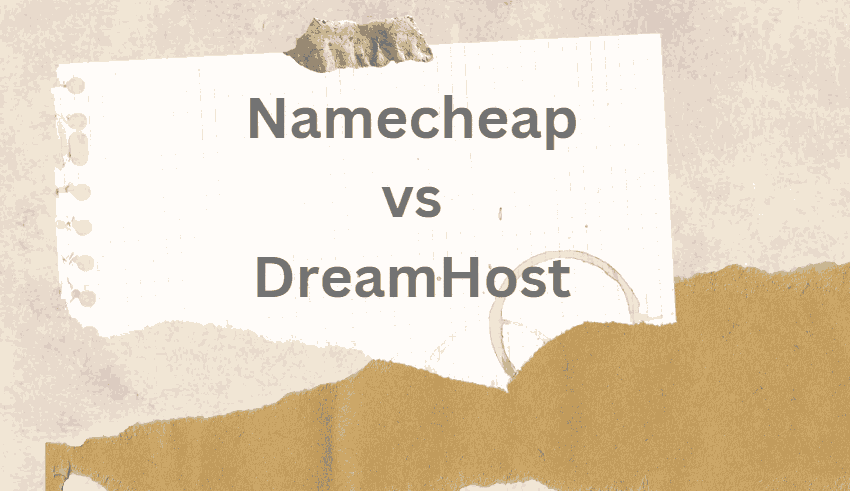Namecheap vs DreamHost web hosting comparison comparing key features such as performance, pricing, pros and cons, and more to assist you in making a decision before signing up with one of these web hosting services.
Namecheap is a domain name and web hosting company based in Phoenix, Arizona that provides comprehensive solutions to expand your company’s presence online. Unmetered bandwidth, a free website builder, protection for your domain name and privacy, free automatic SSL installation, and a 30-day money-back guarantee are just some of the included features. There are many more.
Over 1.5 million websites are supported by DreamHost, which also utilises open-source technology. This was something that the four founders of DreamHost felt was very important.
One of the things that sets DreamHost apart from competing hosting sites is the fact that it provides the most competitive month-to-month pricing options for its hosting plans. You can get hosting at a fraction of the cost of what it would cost elsewhere, and there is no commitment required.
Namecheap vs DreamHost
It should go without saying that you want your web hosting service to shine in the areas that are considered to be the most important. On the other hand, the additional features that it provides on top of the fundamentals might be the factor that determines whether or not it is the ideal solution for your requirements. When your service provider is able to find solutions to problems that are unique to your company and website, this is of even greater value. Namecheap and DreamHost are two companies that can provide you with assistance in a wide variety of different ways.
Highlights from Namecheap
It is essential to the success of any online business that they keep their website up and running at all times. There will not be any dependability issues, as that possibility has been eliminated. Namecheap offers a guarantee that your website will be available at all times. Namecheap provides a guarantee that states you will be eligible for a full refund if your website experiences any downtime at any point during the month.
If you already have a website, you might be hesitant to move it to Namecheap due to the possible complications that could arise from the move. Namecheap, on the other hand, will assist you in transitioning away from the hosting provider you are currently using. In addition, you won’t incur any additional expenses as a result of making the adjustment.
Namecheap offers a basic plan at an affordable price without reducing the number or quality of the services it provides. As a result, it is an appealing choice for businesses that have a limited budget for their websites because it allows them to maintain their current level of service. You can also take advantage of the 30-day money-back guarantee that Namecheap offers, which means that there is no financial risk involved in giving it a try. This guarantee is valid for as long as you keep your account active.

Highlights from DreamHost
The founding members of DreamHost were Dallas Bethune, Josh Jones, Michael Rodriguez, and Sage Weil. They all attended Harvey Mudd College in Claremont, California, where they first met one another. Because of its meteoric rise to prominence since that time, DreamHost is now one of the most well-known and highly regarded web hosts in the entire world.
They are currently capable of supporting over 1.5 million websites with their current infrastructure, of which 750,000 are powered by WordPress. They received the “Best Web Host” award from PCMag’s readers in each of the years 2014, 2015, and 2016.
In addition, DreamHost has been independently validated as a carbon-neutral hosting provider, and the company as a whole is dedicated to lowering its overall environmental impact. In addition to that, they are active participants in the United States Green Chamber of Commerce.

Pros and cons of Namecheap vs DreamHost
We dug deep into Namecheap and DreamHost to show you exactly what each web hosting platform has to offer. Let’s compare their strengths and weaknesses so you can decide which one is a better fit for your company.
Pros of Namecheap
- Price: Because there is so much competition among web hosting companies, pricing is becoming increasingly competitive, which is great news for you as a customer. Namecheap, on the other hand, has a particularly appealing pricing structure. Even the most basic package from the company includes a surprising number of features, giving it an advantage over its competitors. Furthermore, while there is a price increase after the initial period, it is not as significant as the price increase offered by its competitors. This is one area where Namecheap outperforms its competitor.
- Easy to use: Namecheap makes it easier to start a website from scratch or move it from one host to another, depending on whether or not you need to transfer it from an existing host. Transferring your website from another host to Namecheap is completely free. When you want to launch a new website, you have access to a variety of help documents and tutorials that will guide you through the stages of building your first website. Namecheap also provides a variety of different templates. You will have a professional-looking website in almost no time, and you will be able to modify it in the future as your needs change.
- Versatile hosting plans: Namecheap’s more affordable plan options are built on shared hosting. However, if you want to look into other options for hosting your website, NameCheap has you covered there as well. As a Namecheap customer, you can select from WordPress hosting, reseller hosting, VPS hosting, and dedicated hosting.
- History: It’s not always easy to sign up with a company that has a long track record of success in a market that appears to be oversaturated with website hosting providers. Namecheap is a domain registrar that has been in business for over twenty years, making it one of the companies in this industry with the longest history. It added a number of other features and services along the way. Because it has more than 11 million domain names registered under its customers’ names, you can trust Namecheap’s reliability and stability as a web hosting provider.
Areas of Namecheap need to be improved(Cons)
- Security: Despite the fact that it has some desirable security features, Namecheap falls short in a few critical areas. Namecheap provides free SSL certificates that visitors to your website can use to verify the legitimacy of your website. You will be responsible for performing these functions on your own, which may be difficult for beginners. It does not, however, monitor your server or website for malicious software or viruses.
- Customer support: If you use Namecheap and run into a simple problem, you should be able to find the solution in the service’s help documentation or through a chatbot session. Customer service responsiveness at Namecheap, on the other hand, will decrease as the difficulty of your problems increases. Namecheap does not offer telephone support to customers, in contrast to SiteGround, which offers phone support 24 hours a day, seven days a week. Namecheap may be unable to assist you in finding a solution to a difficult problem in a timely manner.
- Simple website building tools: Namecheap does an excellent job of providing basic features to customers at an affordable price, but the company struggles to meet the needs of customers who require more advanced services. This is especially noticeable when building your site, as Namecheap only provides a simple app and pre-made templates to help you. If you need a website with more advanced capabilities than Namecheap’s standard offering, Namecheap will fall short.
Pros of DreamHost
- Price: The pricing for DreamHost is more affordable than that of many other hosting services, except Namecheap. Get web hosting for a period of three years for the low, low price of just $2.59 per month. Alternatively, you can avoid making a long-term commitment and pay a monthly rate that begins at just $1.99. There are only two pricing tiers available, each of these tiers comes with a tonne of features at an affordable price. One of the many unlimited features offered by DreamHost at a price lower than that of the vast majority of competing hosting services is unlimited storage space.
- Uptime: Uptime for DreamHost servers is an impressive 99.99% of the time. It is superior to Namecheap, which has an uptime of approximately 99.82%. That might not seem like a lot until you realise that it equates to several hours of lost productivity every year. DreamHost comes extremely close to reaching perfection in this area, which indicates that your website will almost never be offline, and even if it is, it will be back online in a short amount of time. When it comes to managing a website for a company, some of the most essential considerations include performance and availability. It maintains the functionality of your website, which in turn keeps visitors on the page. It ensures that customers can quickly find what they need, it makes items available to them, and it boosts the reputation of your company by creating a trustworthy online presence.
- Security: You get the same fundamental security features with DreamHost. You will have support for HTTPS2 and PHP7 with DreamHost. In addition to that, it has a built-in firewall and supports multi-factor authentication, which you can turn on if you want to. You can get some additional protection with malware removal service and keep unwanted eyes away from your site with DreamShield, which you can get for an affordable cost of only $3 per month if you sign up for DreamShield.
- Loading speed: The three-second rule can be broken by DreamHost. In the best case scenario, the loading time of its pages can be as little as 1.5 seconds, making it more than Namecheap. It indicates that people are more likely to remain on your site and obtain the product or information that you are offering rather than search elsewhere for it.
- Backup: You will have access to eight backups with DreamHost. Even more, DreamHost offers a backup feature that operates on demand. The only thing that could go wrong here is that, DreamHost’s won’t keep a copy of your backups permanently. You will need to save them to your hard drive so that you always have access to them and can easily restore your website if something goes wrong.
- Storage: Every single one of DreamHost’s hosting plans comes with an unlimited amount of storage space. That feature is not available with each and every web hosting service. Many of them, have tiers in which they will only give you a certain amount of storage space and only offer unlimited storage space at higher tiers. However, regardless of whether you go with shared, dedicated, or virtual private server hosting, DreamHost provides you with unlimited storage right from the beginning. This ensures that you will never be out of space on your server.
- Scalability: Shared, dedicated, and virtual private server hosting are just some of the options available from DreamHost. It also has cloud storage. DreamHost makes all of its hosting plans and features readily available, whereas Bluehost makes an effort to upsell you by offering a wide variety of hosting plans and features. As a result, you won’t feel as overwhelmed while you’re working on your website if you use DreamHost. Additionally, it provides you with a great deal of room for advancement. If you begin with shared hosting, it will be simple for you to upgrade to dedicated or virtual private server hosting as your company expands.
- Bandwidth: You are able to use an unlimited amount of bandwidth with any plan that DreamHost offers, regardless of the type of hosting you have. You won’t ever need to upgrade your plan with DreamHost simply because of the amount of bandwidth you use. Your website will not be rendered inaccessible as a result of the high volume of visitors, and you will not incur additional costs as a result of the expanding success of your company.
Areas of DreamHost need to be improved(Cons):
- User friendly: Because it uses a custom control panel, DreamHost’s platform may, at first, be more difficult to work with than other options. If you don’t mind that or if you have a good understanding of technology, this might not be a problem for you at all. However, if you are not already familiar with it, it won’t matter if the interface appears cleaner and has fewer advertisements; it will still take some time to figure out how to use it.
- Server location: Even though DreamHost has two server locations in Virginia and Oregon, it does not have an advantage over Namecheap because both of their data centres are located in the United States. This could make things more difficult for users located in other countries, especially considering that DreamHost does not offer 24/7 chat support.
Bottom Line
Namecheap and DreamHost are two popular web hosting companies that are frequently compared. These may share some similarities as well as distinguishing features. Plans and pricing, support, key features, security, uptime, and performance are the main differences.
In a comparison of the prices offered by Namecheap and DreamHost for shared hosting, Namecheap is the more cost-effective choice, with shared hosting plans beginning at $1.58 per month. At the same time, package prices at DreamHost begin at just $2.59 per month.
It is immediately apparent that the Stellar plan offered by Namecheap is the more cost-effective choice. In terms of providing the best value, it’s a toss-up, but Namecheap’s Stellar comes out on top because it’s more affordable and allows you to host three different websites. However, DreamHost is certainly not too far behind with increased storage space and daily automatic backups of your data.
It is also important to note that DreamHost offers a 97-day money-back guarantee for customers who purchase shared hosting from them. Namecheap, on the other hand, only offers the industry-standard 30-day guarantee.
The performance comparison between Namecheap and DreamHost concludes that DreamHost is the superior option, as it is shown to be the more dependable as well as the overall faster service provider.
In this particular matchup between Namecheap and DreamHost, DreamHost emerges victorious overall. Its prices are a touch higher than those offered by Namecheap, but they are still very reasonable. In addition to this, exceptionally dependable, startlingly quick, and secure. Even though it could be improved with a chat option that is available 24/7, this is not a deal breaker because it has an excellent ticketing system that steps in and does a masterful job.
